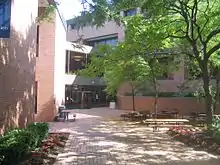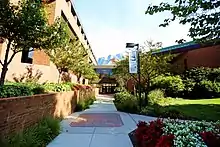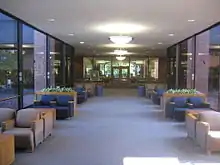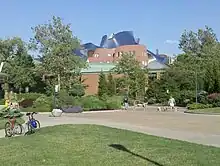Case Western Reserve University School of Law
Case Western Reserve University School of Law is one of eight schools at Case Western Reserve University in Cleveland, Ohio. It was one of the first schools accredited by the American Bar Association.[3] It is a member of the Association of American Law Schools (AALS).[4] It was initially named for Franklin Thomas Backus, a justice of the Ohio Supreme Court, whose widow donated $50,000 to found the school in 1892.[5]
| Case Western Reserve University School of Law | |
|---|---|
 | |
| Established | 1892 |
| School type | Private |
| Dean | Jessica Wilen Berg and Michael Scharf |
| Location | Cleveland, Ohio, U.S. |
| Enrollment | 422 |
| Faculty | 68 full-time |
| USNWR ranking | 80th (2024)[1] |
| Bar pass rate | 86.73% (2022 first time takers)[2] |
| Website | www |
According to Case Western Reserve's official 2018 ABA-required disclosures, 65.9% of the Class of 2018 obtained full-time, long-term, bar passage-required employment nine months after graduation, excluding solo-practitioners, ranking 114th out of 200 ABA-approved law schools.[6][7]
Academics

The student-faculty ratio is 6.8:1.[8] In August 2013, by a near-unanimous vote, the faculty adopted a new curriculum to reflect changes in the legal profession. The model is designed to blend practice, theory, and professionalism in all three years of law school. Students begin working with clients in the first year of law school. Writing and skills-oriented courses track course content to the school's substantive-law courses to blend theory and practice. Students also learn transactional drafting, financial literacy, and statutory and regulatory analysis during their first year.
During the second year of law school, students specialize and continue to build on the skills they learned during their first year. The law school's concentrations include health care law, international law, national security law, and law, technology, and the arts.
Beginning in 2016, a capstone semester became a hallmark of the third year. All students practice law full-time by working on cases through the Milton A. Kramer Law Clinic Center at the law school or through an externship. Students may do externships in the U.S. or abroad. A select number of students may competitively apply to spend their third year in Europe, completing a foreign LLM degree in addition to their Case JD, at no additional cost.
Students learn leadership through courses developed by faculty at Case Western's Weatherhead School of Management, and students graduate with e-portfolios of their work to share with employers.
Rankings
The school was ranked 78th by the U.S. News & World Report on its 2023 law school rankings.[10] U.S. News & World Report has ranked its Health Care Law program ranked tied for 9th in the nation.[11] In addition to its JD curriculum, the law school offers LLM and SJD degrees to foreign-trained lawyers. It also offers an Executive Master of Arts in Financial Integrity and a Masters in Patent Practice.
Journals

- Case Western Reserve Law Review
- Canada-US Law Journal
- Health Matrix: Journal of Law-Medicine
- Case Western Reserve Journal of Law, Technology & the Internet
- Case Western Reserve Journal of International Law
Academic centers
- Frederick K. Cox International Law Center
- Center for Law, Technology and the Arts
- The Law-Medicine Center
- Center for Business Law and Regulation
- Canada-US Law Institute

Post-graduation employment
According to Case Western Reserve's official 2018 ABA-required disclosures, 65.9% of the Class of 2018 obtained full-time, long-term, bar passage-required employment nine months after graduation, excluding solo-practitioners.[6] The school ranked 114th out of 200 ABA-approved law schools in terms of the percentage of 2018 graduates with non-school-funded, full-time, long-term, bar passage required jobs nine months after graduation.[7]
For 2021, Case Western Reserve's Law School Transparency under-employment score was 15%, indicating the percentage of the Class of 2021 unemployed, pursuing an additional degree, or working in a non-professional, short-term, or part-time job nine months after graduation.[12] 93.4% of the Class of 2021 was employed in some capacity including non-professional, part-time, and short-term employment, while 0.7% were pursuing graduate degrees, and 5.9% were unemployed nine months after graduation.[6] The most graduates, 23.5%, were employed in public service.[13]
Ohio was the primary employment destination for 2021 Case Western Reserve graduates, with 46.1% of employed graduates working in the state.[6] The next two most popular locations for Case Western graduates to accept employment were nine graduates in Washington, D.C., and nine in New York. In addition, two graduates from the class of 2021 accepted positions abroad.[6]
Costs
The total cost of attendance (indicating the cost of tuition, fees, and living expenses) at Case Western Reserve for the 2022-2023 academic year was $85,792.[14] Case Western Reserve's tuition and fees on average increase 3.03% annually.[13] The Law School Transparency estimated debt-financed cost of attendance for three years is $320,718, while 47.8% of students received an annual discount greater than or equal to $40,000.[13]
Notable faculty
- Jonathan H. Adler – A contributing editor to National Review Online and a regular contributor to The Volokh Conspiracy.
- Michael Scharf – A recognized international expert on international criminal law and author of "Enemy of the State: The Trial and Execution of Saddam Hussein," Scharf serves as co-dean of the law school and is the director of the Frederick K. Cox International Law Center.
- Henry T. King Jr. – A U.S. Prosecutor at the Nuremberg Trials in 1946-47. From the mid-1980s until his death in 2009 he was a professor at the law school. David M. Crane described King as "the George Washington of modern international law".
- Charles Korsmo – A former child actor turned lawyer and law professor.
- Peter Junger – A computer law professor and Internet activist who was a professor at the law school from 1970-2001.
Notable graduates

Among Case Western alumni are prominent elected officials, particularly from the State of Ohio. Examples of such include current Ohio State Treasurer Josh Mandel, former Ohio Attorneys General Marc Dann, Lee Fisher, and Jim Petro, and former U.S. Representatives Stephanie Tubbs Jones and Ron Klein.
Members of the bench who are Case Western alumni include Kathleen M. O'Malley of the United States Court of Appeals for the Federal Circuit, and John J. McConnell, Jr. of the United States District Court for the District of Rhode Island. Both were appointed to their current positions by President Barack Obama. Associate Justice John Hessin Clarke of the United States Supreme Court (from 1916 to 1922) was educated when the school was known as Western Reserve College. Associate Justice Jeffrey Hjelm of the Maine Supreme Judicial Court is also an alumnus.
Other Case alumni are involved in the fields of government, business, academia, and the judiciary.
Government and politics
- Ann Womer Benjamin, director of the Northeast Ohio Council on Higher Education, former director of the Ohio Department of Insurance[15]
- Justin Bibb, 58th and current Mayor of Cleveland
- Oliver P. Bolton, former member of the U.S. House of Representatives, son of Representatives Chester Castle Bolton and Frances Payne Bolton[16]
- Elizabeth M. Boyer, lawyer, writer/publisher, and feminist founder of WEAL
- Thomas A. Burke, former U.S. Senator and Mayor of Cleveland
- Mohamed Ibn Chambas, Secretary-General, African, Caribbean and Pacific Group of States
- Marc Dann, former Attorney General of Ohio
- Lincoln Díaz-Balart, former member of the U.S. House of Representatives[17]
- Lee Fisher, former Attorney General of Ohio, former Lieutenant Governor of Ohio, and dean of Cleveland–Marshall College of Law as of 2016.
- Herman Goldner, mayor of St. Petersburg, Florida, 1961–1967, 1971–1973[18]
- Tim Grendell, Ohio State Senator
- Ray Gricar, former District Attorney of Centre County, Pennsylvania
- Martin J. Gruenberg, chairman of the Federal Deposit Insurance Corporation
- Thomas J. Herbert, former Governor of Ohio, Attorney General of Ohio, and Associate Justice of the Supreme Court of Ohio
- Martin Hoke, former member of the U.S. House of Representatives
- Stephanie Tubbs Jones, late judge, prosecutor and member of the U.S. House of Representatives
- Ron Klein, former member of the U.S. House of Representatives
- Donald L. Korb, former Internal Revenue Service Chief Counsel[19]
- William J. Laub, mayor of Akron, Ohio, professional football player, professional football coach
- Claire Levy, executive director of the Colorado Center on Law and Policy and former member of the Colorado House of Representatives
- Josh Mandel, Ohio State Treasurer
- Capricia Marshall, former Chief of Protocol of the United States
- Roscoe C. McCulloch, former U.S. Senator and member of the U.S. House of Representatives
- Nicole Nason, former administrator, National Highway Traffic Safety Administration
- Kevin G. Nealer, senior fellow, The Forum for International Policy
- Jim Petro, former Attorney General of Ohio
- John F. Sopko, Special Inspector General for Afghanistan Reconstruction[20]
- Charles W. Stage, former member of the Ohio House of Representatives
- Michael Turner, member of the U.S. House of Representatives
- Charles Vanik, former member of the U.S. House of Representatives
- Wayne Wheeler, prominent prohibition leader and lobbyist/general counsel to the Anti-Saloon League
- Charles Z. Wick, director of the USIA (existed from 1953 to 1999) under President Ronald Reagan
- Stephen M. Young, former U.S. Senator[21]
- François-Philippe Champagne, Canadian Minister of Foreign Affairs[22]
Business and industry
- William Daroff, chief lobbyist for Jewish Federations of North America and appointee to US Commission for the Preservation of America's Heritage Abroad
- Barry Meyer, former chairman of Warner Bros. Entertainment
- Robert L. Stark (born 1951), American real estate developer and CEO of Stark Enterprises
- Mark Weinberger, former chairman and CEO of Ernst & Young and former Assistant Secretary of the Treasury for Tax Policy
- Jacob Frydman, real estate developer
Judicial
- Susan G. Braden, former chief judge, United States Court of Federal Claims[23]
- Rebecca Dallet, Justice, Wisconsin Supreme Court[24]
- Emerich B. Freed, former judge, United States District Court for the Northern District of Ohio[25]
- Ben Charles Green, former judge, United States District Court for the Northern District of Ohio[26]
- Lynn B. Griffith, former justice, Supreme Court of Ohio (1962–1964)[27]
- Jeffrey Hjelm, Justice, Maine Supreme Judicial Court[28]
- Alvin Krenzler, former judge, United States District Court for the Northern District of Ohio[29]
- Blanche Krupansky, former justice, Supreme Court of Ohio (1981–1983)[30]
- Robert B. Krupansky, former judge, United States Court of Appeals for the Sixth Circuit[31]
- John James McConnell, Jr., District Judge for the United States District Court for the District of Rhode Island[32]
- Kathleen M. O'Malley, Circuit Judge for the United States Court of Appeals for the Federal Circuit[33]
- Edmund A. Sargus Jr., District Judge for the United States District Court for the Southern District of Ohio[34]
- Leslie Crocker Snyder, former judge, New York State Supreme Court (New York’s trial court), and former candidate for Manhattan District Attorney[35][36]
- Joseph F. Spaniol Jr., 18th Clerk of the Supreme Court of the United States[37]
- Don John Young, former judge, United States District Court for the Northern District of Ohio[38]
Academia
- Kenneth B. Davis, former dean of University of Wisconsin Law School[39]
- Amos N. Guiora, professor, S.J. Quinney College of Law, University of Utah[40]
- Kevin G. Nealer, professor, Georgetown School of Business, Fulbright Professor of trade law and policy in the People's Republic of China[41]
- Ted Gup, professor of journalism, Emerson College
- Lee Fisher, dean, Cleveland-Marshall College of Law
Other
- Nan Aron, public interest lawyer, civil rights advocate, and president of the Alliance for Justice
- Fred Gray, attorney to the Rev. Dr. Martin Luther King Jr., and Rosa Parks[42]
- Mike Lebowitz, attorney, legal pioneer in military expression, military law[43]
- Jeff Herman, church sex abuse attorney, Catholic Church sexual abuse cases
- C.B. King, civil rights attorney in the South during the civil rights movement[44]
- Andrew Zashin, American Family Law attorney, legal writer and commentator. Adjunct Professor of Law at Case Western Reserve University School of Law
In popular culture
- In 2010, the show The Deep End on ABC features a main character, Addy Fisher, who graduated from CWRU School of Law.
References
- "Case Western Reserve University". U.S. News & World Report – Best Law Schools. Retrieved 13 May 2023.
- "Case Western Reserve University - 2023 First Time Bar Passage". abarequireddisclosures.org. American Bar Association. Retrieved 6 March 2023.
- "By Year Approved". www.americanbar.org.
- "Member Schools". Association of American Law Schools.
- "Backus, Franklin Thomas". Encyclopedia of Cleveland History. 11 Jul 1997. Retrieved 21 June 2015.
- "Case Western Reserve University Employment Summaries for 2018 & 2021 Graduates". abarequireddisclosures.org. American Bar Association. Retrieved 6 March 2023.
- Leichter, Matt (6 May 2019). "Class of 2018 Employment Report: The Rankings". The Law School Tuition Bubble. Retrieved 6 March 2023.
- "USNWR Ranking".
- "Case Western Reserve University - 2022 Standard 509 Information Report". abarequireddisclosures.org. American Bar Association. Retrieved 6 March 2023.
- "2023 U.S. News Law School Rankings".
- "USNWR Law School Ranking".
- "Case Western Reserve University Profile". Law School Transparency. Retrieved 6 March 2023.
- "Case Western Reserve University Quick Stats". Law School Transparency. Retrieved 3 March 2023.
- "Financial Aid & Scholarships". Case Western Reserve University School of Law. 26 April 2019. Retrieved 6 March 2023.
- "Ann Womer Benjamin — The Ohio Statehouse". www.ohiostatehouse.org. Archived from the original on April 29, 2017. Retrieved June 27, 2019.
- "Andrew Meacham, "Mayor packed ideas, pipe tobacco in rich public life," September 15, 2010". Tampa Bay Times. Archived from the original on June 5, 2014. Retrieved June 1, 2014.
- "Donald L. Korb". www.sullcrom.com. Retrieved May 7, 2020.
- "SIGAR | Leadership". www.sigar.mil. Retrieved 2021-08-17.
- Biography of Stephen M. Young, OhioLink .
- "CWRU Law Alumnus Appointed Canada's New Minister of Foreign Affairs | School of Law | Case Western Reserve University". case.edu. Retrieved 2019-11-20.
- Joint Committee on Printing, Official Congressional Directory, 2007-2008: 110th Congress, p. 860.
- Beck, Molly (March 25, 2018). "Get to know Wisconsin Supreme Court candidates Rebecca Dallet and Michael Screnock". Wisconsin State Journal. Retrieved April 3, 2018.
- Neff, William B, ed. (1921). Bench and Bar of Northern Ohio History and Biography. Cleveland: The Historical Publishing Company. pp. 399–400.
- "History of the Sixth Circuit: Ben Charles Green". U.S. Court of Appeals for the Sixth Circuit. Archived from the original on May 12, 2009. Retrieved June 28, 2019.
- Neff, William B, ed. (1921). Bench and Bar of Northern Ohio History and Biography. Cleveland: The Historical Publishing Company. p. 425.
- Cousins, Christopher (May 7, 2014). "LePage nominates Hjelm to Maine's high court, Stokes to Superior Court". Bangor Daily News. Retrieved July 19, 2016.
- "Krenzler, Alvin I. - Federal Judicial Center". www.fjc.gov. Retrieved June 29, 2019.
- "The Supreme Court of Ohio and The Ohio Judicial System - Blanche Ethel Krupansky". Ohio Supreme Court. Retrieved June 29, 2019.
- "Krupansky, Robert B. - Federal Judicial Center". www.fjc.gov. Retrieved June 29, 2019.
- "McConnell, John James Jr. – Federal Judicial Center". www.fjc.gov.
- "O'Malley, Kathleen McDonald - Federal Judicial Center". www.fjc.gov.
- Gray, Kathy Lynn (12 January 2015). "Sargus takes reins as new chief judge in federal court". The Columbus Dispatch. Retrieved 21 January 2015.
- Eaton, Phoebe (May 16, 2005). "The Sixtysomething Upstart". New York.
- Hanna, Julia (June 1, 2003). "Ruling from the Bench: Leslie Crocker Snyder". Harvard Business School Alumni Bulletin. Retrieved 3 November 2015.
- "Joseph F. Spaniol, Jr". American Law Institute. Retrieved July 5, 2019.
- Don John Young at the Biographical Directory of Federal Judges, a public domain publication of the Federal Judicial Center.
- "UW Law Faculty Profile for Dean Davis". University of Wisconsin. Retrieved July 6, 2019.
- "Amos N. Guiora". SJ Quinney College of Law. February 22, 2008. Archived from the original on February 22, 2008.
- "President Obama Announces More Key Administration Posts". whitehouse.gov. October 1, 2014.
- Key, Barclay (15 April 2008). "Fred Gray". Encyclopedia of Alabama. Retrieved 30 July 2017.
- Stephen Koff, "Marines Muzzle Protester", Honolulu Star-Bulletin (June 1, 2007), Section C, p. 9.
- "C.B. King". Georgia Encyclopedia. Retrieved June 26, 2019.
